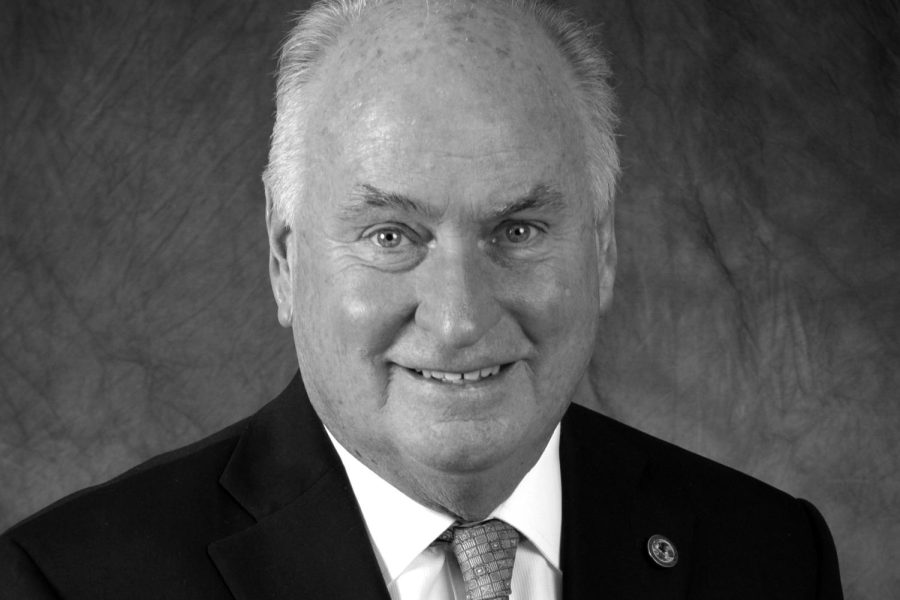Meet Dan Brady, the Republican running for Illinois Secretary of State
Republican candidate Dan Brady talks driver education, organ donors, and libraries ahead of midterm elections
Brady for Secretary of State
Dan Brady, who is running for Illinois Secretary of State, has been a Republicaion state representative in Springfield since 2001.
October 28, 2022
State representative Dan Brady is a Republican running for Illinois Secretary of State against Democrat Alexi Giannoulias to fill current retiring secretary of state Jesse White. Dan Brady has been the state’s house leader, minority leader, deputy republican leader, and is currently our state representative.
Can you tell me some things about yourself?
I presently serve as state representative in the 105th Legislative District, which is the Bloomington-Normal McLean County area in Livingston County. So that’s my present role as state representative.
I served as the elected coroner in McLean County, and have been involved in the funeral home business as a funeral director over the years. I was born and raised in the Bloomington area. I have a wife and two children.
What is your proudest accomplishment?
I think my proudest accomplishment would probably be legislation. I served on a number of committees, but one of the areas that I’ve been very passionate about is organ and tissue donation and related legislation and issues. In fact, I co-sponsored legislation allowing 16 and 17 year olds to be listed on the organ and tissue registry through the Secretary of State’s office when they become a new driver, with a parental override, allowing them to make that decision whether they would like to be an organ donor. So that’s one of my areas of accomplishment. Then dealing with senior defensive driving and legislation I passed with help from the insurance industry in Illinois and the National Safety Council.
Why do you believe lowering the age for organ donation will be beneficial?
I think that it would help with awareness. On the education side of things, [moving the age to 16 or 17] allows them to have a [say] in the decision making process of organ donation. Secondly, it would help potentially increase numbers for organ donation, but it certainly would increase numbers as far as registration to be an organ donor goes. And that’s very, very important in Illinois.
What do you believe can be done to better driver education in Illinois?
I’m interested in a public-private partnership and expanding [driver’s education] within our public schools and our private schools. Private driving classes would be working with a [company] called Tire Rack, that has a particular course in street survival. When they get their license, [young drivers complete this program] at a behind the wheel test site and see how that vehicle reacts at various speeds and different maneuvers, so they get a true feel for what it’s like at a higher rate of speed and some of the things that can occur or how a vehicle reacts to them, so they can respond with their driving capabilities. I think that would be an important role that we could expand upon. I’d also like to work with our schools and driver courses to involve the Secretary of State’s police more into the classroom.
Can you talk more about the Secretary of State’s police? What would that look like in classrooms?
The Secretary of State has its own police division and, in that division, they have road investigators. It used to be that it was a more common practice that those road investigators would be involved to some degree in driver’s education. What I’d like to see is a course working with our public schools, our private schools — and, in particular, driver’s education services from the Secretary of State officers coming back in and talking about several things.
For example: What’s the title of the vehicle? What’s that mean to a new driver? What’s a lien meaning to the lien holder? What does it mean if you have an impaired driving situation and you receive a ticket? What happens to your license to the administrative hearing process and how can you lose that license for a lengthy period of time? Having that interaction [with these officers] and having young people interact and ask questions, I think would be a very valuable experience in the classroom.
How do you believe adding libraries and better funding libraries would better our communities and our state?
Well, first, there’s roughly 5,000 libraries and the Secretary of State is the chief librarian of Illinois.
Now, what’s that mean? It means that the Secretary of State has divisions under their library division, in particular, infrastructure or grant construction. And what I’d like to do as a priority, especially in rural Illinois, [is bring] broadband, Wi-Fi and digital technology that does not exist in some of the libraries today and see how the Secretary of State’s office could help that expansion and remodeling of libraries to the grant process.
I would like to make a continued priority of the literacy programs, adult literacy in particular. The Secretary of State’s office has to continue to reach those that are adult illiterate.
What effects do you think that’ll have within their community then?
I think that with a local library — whether that be elected or volunteer library board — being able to partner with the state library association and creating a priority list of some of the most needy libraries across the state. And envision the idea that we could get libraries up to speed from technology to where young people could use those technologies through a library that they may not have at their own residences, not just during the school year, but all year long. Being able to prioritize rural Illinois is something that is desperately needed and would be greatly appreciated by many in the educational system.
What do you mean by enhancing services for older adults?
One of those is legislation that I recently passed, which was a defensive driving course for seniors and allowing them to be able to do that remotely instead of having to go into a classroom setting.
Now, in part, that was done for COVID, but also it allows the senior individual to take a defensive driving course required for the eight hours through the Secretary of State and have that done and work at their own pace. In other words, they can come and start and stop a training video or what they’re doing remotely, and then they would have the potential to submit that certificate of completion to their insurance company and have the potential to have a reduction in their car insurance premiums because of their good driving. That’s enhancement of senior services — and that bill is not long.
[We have also enhanced services] by looking at our 96 Department of Motor Vehicles facilities across the state. And I’d like to make sure that in those facilities there is enhancement for seniors. In other words, [I hope to] continue the senior advances to the front of the line. And that seniors have a prominent role of special help in those facilities throughout the state. That’s what I mean by enhancing senior services.
How do you plan to build upon the work current Secretary Jesse White has done for Illinois?
Well, number one, I worked with Secretary White as state representative on a number of those issues that I talked about earlier — organ and tissue donation, distracted driving for teens and driving related issues for seniors. I worked with the Secretary himself in his office and it helped enact legislation in those areas. So, by partnering, I believe it gives me great experience about the operation of the office.
Secondly, my role as representative has given me the ability to understand the budget process better for the Secretary State. That’s a little over $474 million dollars from the operational funds of the state of Illinois. On top of that, I believe that what I would be is a very hands-on secretary of state — in other words, being out in the facilities across the state of Illinois, leading a little over 4,000 employees in the Secretary of State’s office and the 21 different divisions that make up the Secretary of State’s office and by interacting and being accessible.
Leading in those areas, I believe not only from the employee side of things, we could be able to provide more resources to help them, but also from the customer side of things so it’s a more pleasant experience between the Secretary State’s office and the customer.
So if you win the election, what do you plan to accomplish first in office?
I think one of the first things that I hear on the campaign trail all the time is reducing the wait times — cutting the wait times and improving technology services, more remote services, more online services, always trying to [support] seniors in particular that may not be so tech savvy and still wanna come into a facility. We can do that initially by fully staffing the facilities, motor vehicle services and divisions across the state of Illinois.
The other thing we could do to help employees help customers is cross-training those employees in the primary two reasons why you end up in a Secretary of State Office for motor vehicle services. One is for driving services, and the other is vehicle-related services. Having staff that’s cross-trained in both of those areas would prevent coming to the end of the line and then being told someone’s not there that day or that the employee doesn’t know what exactly to do and you, as a customer, have to come back. We could reduce that, which would help not only from the wait times, but it would help the accessibility of providing services and give resources not only to the employees by training, but obviously the benefits of the customer.











